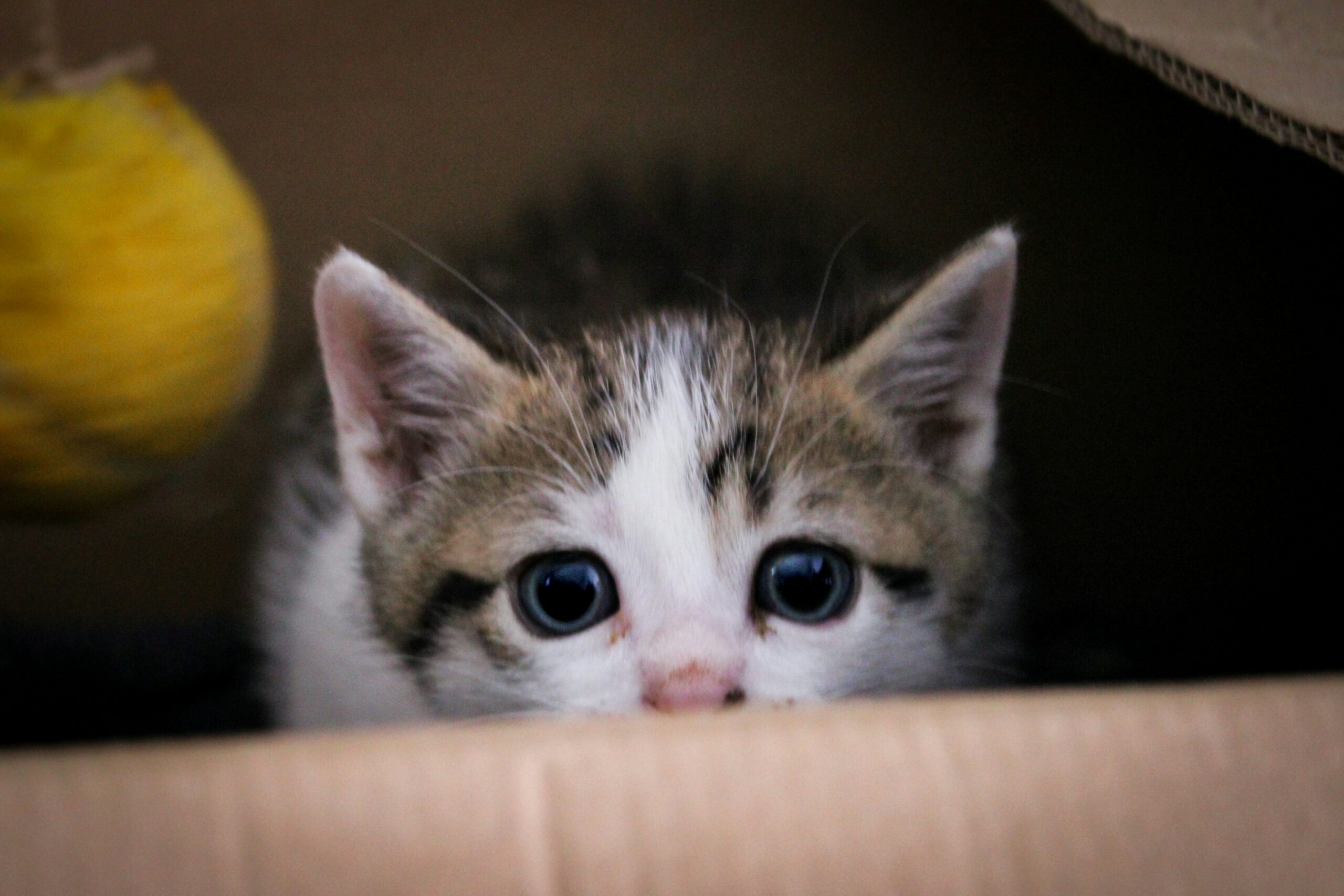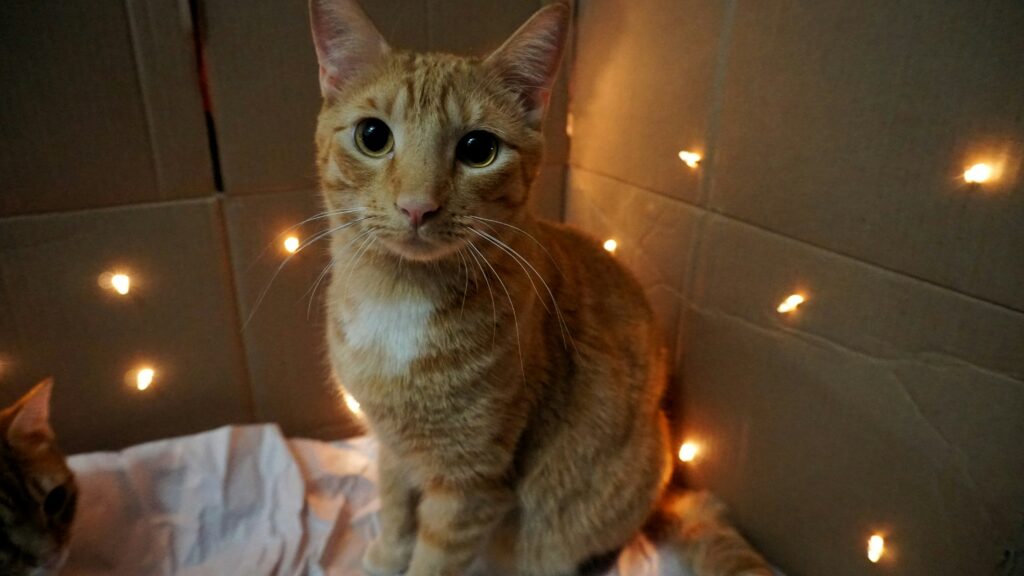
Cats are fascinating creatures with countless quirks and behaviors that leave owners curious, one of the most charming of which is their love for boxes. From hiding in shoeboxes to squeezing into the tiniest spaces, cats seem to have an undeniable attraction to these simple cardboard enclosures. But what exactly is it about boxes that cats find so compelling? Here, we’ll explore the scientific reasons behind this feline obsession with boxes.
The Comfort of Enclosure: Instinctual Behavior in Cats
One of the main reasons cats love boxes is the sense of security they provide. Cats are both hunters and prey in the wild, and their survival instincts drive them to seek out enclosed spaces where they feel protected. A box’s four walls offer cats a sense of enclosure and shelter, where they can observe their surroundings without feeling exposed.
In nature, a secure hiding spot is vital for cats to remain out of sight from predators and to rest without fear. Domesticated cats may not face the same threats as their wild counterparts, but these instincts persist. When a cat curls up in a box, it’s emulating this natural behavior, making the box a safe space where it can rest and feel at ease.
Boxes as Stress Relievers
Boxes can also function as a natural stress reliever for cats. Studies show that cats use hiding spaces to reduce stress and cope with unfamiliar or challenging environments. In a study conducted by the University of Utrecht, shelter cats provided with hiding boxes adapted to their new surroundings more quickly and displayed lower stress levels than those without boxes. This research underscores that the psychological benefit of boxes can help make a cat feel more comfortable and relaxed, especially in unfamiliar or stressful environments.
Understanding the Effect of Stress Reduction in Cats
When cats are stressed, their bodies produce higher levels of cortisol, a stress hormone. Boxes act as a refuge that helps cats reduce their cortisol levels, enabling them to feel calmer and more relaxed. For domestic cats, a box can help alleviate stress caused by environmental changes, new pets, or other disruptions. As a result, offering a box as a retreat space for your cat can support its mental health.
Warmth and Insulation
Another scientific reason cats are attracted to boxes is that they offer a cozy, warm space. Cats have a slightly higher preferred ambient temperature than humans, around 86-97°F (30-36°C), which often leads them to seek out warm, enclosed spots. Boxes, especially those made of cardboard, are excellent insulators, trapping heat and creating a warm environment that cats find inviting.
When a cat curls up inside a box, it can conserve its body heat more effectively than in open spaces, which helps explain why they might seek out boxes during cooler months. For cats, a box provides the perfect mix of warmth and security, making it a favored spot for relaxation and naps.

Curiosity and Play: Cats’ Natural Exploratory Behavior
Cats are inherently curious animals, and boxes provide an ideal environment for exploration and play. A box offers a new, enclosed space that a cat can investigate, paw, and explore, keeping it entertained and engaged. This sense of novelty and excitement plays into a cat’s instinct to explore new territories, making boxes the ideal objects for playful discovery.
Boxes also serve as excellent hiding places for cats during play. If you’ve ever noticed a cat crouching in a box and leaping out at a toy or another pet, you’ve witnessed this natural hunting behavior in action. Boxes allow cats to practice their hunting instincts in a safe and controlled environment, where they can pounce, hide, and ambush without consequence.
An Answer to the Sensory Stimuli in Their Environment
In addition to satisfying curiosity, boxes provide a controlled sensory environment. Cats have highly developed senses, particularly their sense of smell and hearing, and can quickly become overwhelmed by external stimuli. A box offers a kind of sensory refuge, muting sounds and scents from outside. This sensory control is another reason cats may retreat to boxes when they feel overstimulated or stressed.
By limiting the amount of external stimuli, a box allows a cat to relax and focus only on what it wants to, contributing to a sense of calm and safety. This behavior is similar to how humans use quiet spaces to relax, helping them feel more at ease by blocking out unwanted noise or distractions.
Natural Temperature Preferences and Insulation Benefits
Cats also have distinct preferences when it comes to temperature. Boxes, particularly those made of cardboard, act as insulators, trapping warmth within and creating a cozy, thermally regulated environment. Cats typically prefer slightly warmer environments than humans, so the insulating qualities of cardboard make a box an ideal retreat.
The “If It Fits, I Sits” Phenomenon
Perhaps one of the most amusing aspects of cats’ obsession with boxes is the so-called “If I Fits, I Sits” phenomenon. This behavior, seen when cats squeeze into small spaces, regardless of their size, is thought to be linked to their unique body flexibility and ability to adapt to confined spaces. As natural-born hunters, cats can twist and compress their bodies to fit into tight areas, which also provides a sense of satisfaction. Boxes offer a structured space that allows cats to experience this “fitting” sensation.
How to Use Boxes to Enrich Your Cat’s Environment
Given cats’ love for boxes, adding boxes to your home can be a simple way to enrich their environment. Here are some creative ways to use boxes for your cat:
- Create a maze: Arrange several boxes together to form a maze or tunnel for your cat to explore.
- Add comfort items: Place a blanket or soft cloth inside the box to make it even more inviting.
- Rotate boxes periodically: Cats enjoy novelty, so swapping out boxes or moving them to different locations can keep your cat engaged.
Conclusion
Cats’ love for boxes stems from a combination of instincts, sensory preferences, and natural behaviors. Whether it’s for security, stress relief, warmth, or just plain fun, boxes serve a range of functions that appeal to the feline mind. Understanding why cats love boxes allows us to appreciate this quirky behavior and use it to improve their well-being. So next time you receive a package, think twice before discarding the box – it might just be your cat’s new favorite hideout!
References
- “Why do cats like to squeeze themselves into small spaces?” Burgess Pet Care
- “Study on Shelter Cats’ Stress and Hiding Boxes.” National Institutes of Health (NIH)
- “The Ideal Temperature Range for Cats.” Hillspet
Jun Hao is a passionate advocate for pet adoption, care, and volunteering. With a heart dedicated to giving animals another chance, Jun Hao spends his days promoting the joys of rescuing and rehoming pets.
“Every pet deserves love and care, and I’m here to support their journey.”
Share this:
- Click to share on WhatsApp (Opens in new window) WhatsApp
- Click to share on Facebook (Opens in new window) Facebook
- Click to share on LinkedIn (Opens in new window) LinkedIn
- Click to share on Pinterest (Opens in new window) Pinterest
- Click to share on Tumblr (Opens in new window) Tumblr
- Click to share on X (Opens in new window) X
- Click to share on Reddit (Opens in new window) Reddit
- Click to share on Telegram (Opens in new window) Telegram
- Click to email a link to a friend (Opens in new window) Email
- Click to print (Opens in new window) Print






























